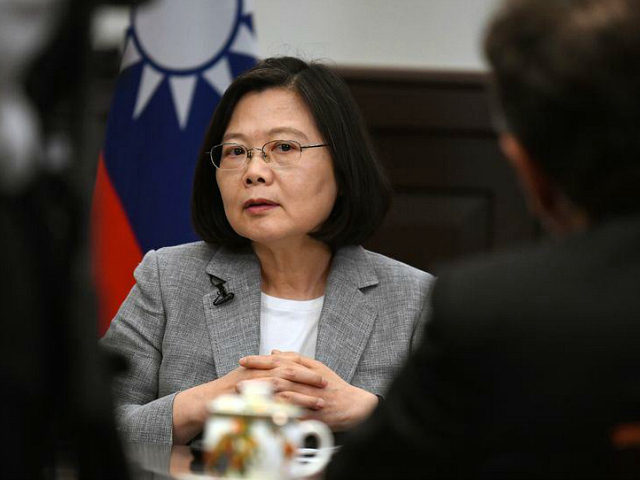The government of Taiwan published a letter, Fox News reported on Monday, sent to officials at the World Health Organization (WHO) in December warning of “atypical pneumonia” in China – evidence, Taipei says, that the WHO had reason to believe the Chinese coronavirus was contagious.
On January 14, weeks after Taiwan’s health authorities sent the email, the WHO published a message on Twitter citing Communist Party officials claiming that the coronavirus was not transmissible among human beings.
Preliminary investigations conducted by the Chinese authorities have found no clear evidence of human-to-human transmission of the novel #coronavirus (2019-nCoV) identified in #Wuhan, #China🇳. pic.twitter.com/Fnl5P877VG
— World Health Organization (WHO) (@WHO) January 14, 2020
The virus has since been proven to be so contagious that most of the world’s nations have forced entire populations into lockdown, threatening citizens to stay in their homes and not come into contact with other people. Taiwan is among the world’s nations least affected by the virus due to early action to limit travel from China into the country and treating the disease as contagious.
Taiwanese Health Minister Chen Shih-Chung published the message his country sent to the WHO in December during a press conference Saturday, a response to the WHO denying that Taiwan had alerted it to a contagious disease.
“News resources today indicate that at least seven atypical pneumonia cases were reported in Wuhan, CHINA,” the email, from Central Epidemic Command Center (CECC), read. “Their [China’s] health authorities replied to the media that the cases were believed not SARS [Sudden Acute Respiratory Syndrome, the disease typically associated with the phrase ‘atypical pneumonia’]; however the samples are still under examination, and cases have been isolated for treatment.”
“I would greatly appreciate if you have relevant information to share with us,” the Taiwanese official’s message concluded.
The facts regarding Taiwan’s email to alert WHO to possible danger of #COVID19#email內容 #TaiwanCanHelp #TaiwanIsHelping @WHO
英文新聞稿:https://t.co/AvyHulhrlU pic.twitter.com/nYvmY4R2ao
— MOHW of Taiwan (@MOHW_Taiwan) April 11, 2020
Prior to the publication of the message, representatives of the Taiwanese government had repeatedly noted that they attempted to reach out to the WHO and urge it to use its communications arms to alert the world to a new Chinese disease.
“Taiwan did report our concern on the severity of coronavirus last December to the WHO,” Taiwan’s Economic and Cultural Representative Office in the United States (TECRO) told Breitbart News last month. “But as a rule, our reporting is always a one-way street. WHO mostly ignored our messages and never shared information as they do to other countries.”
Taiwan also complained repeatedly that the WHO did not send them relevant public health information to keep citizens safe and published Chinese Communist Party misinformation, including labeling Taiwan part of China and combining China’s astronomical number of coronavirus cases to the small number confirmed in Taiwan, making the outbreak on the island seem far larger than it was and hurting Taiwan’s economy. The WHO also published incorrect Taiwanese maps.
Initially facing criticism for ignoring Taiwan’s warnings late last year, WHO officials claimed that, in Taiwan’s message, “There was no mention in the message of human-to-human transmission.”
WHO director-general Tedros Adhanom Ghebreyesus, who is not a medical doctor, responded personally to Taiwan’s statements regarding discrimination against the country by the agency by claiming, without evidence, that Taipei had launched a campaign of racist invective against him for being Ethiopian.
“I can tell you personal attacks that have been going on for more than two, three months. Abuses, or racist comments, giving me names, black or Negro. I’m proud of being black, proud of being Negro,” Tedros said last week. “Three months ago, this attack came from Taiwan. We need to be honest. I will be straight today. From Taiwan. And Taiwan, the Foreign Ministry also, they know the campaign. They didn’t disassociate themselves.”
Tedros did not offer any examples of the “personal attacks” against his race that Taiwan allegedly levied. Taiwanese President Tsai Ing-wen responded to the rant by denying the accusations and inviting him to visit the country.
Tedros has not publicly commented on reports of Africans in Guangzhou, southern China, being evicted, expelled from businesses, fired, and being forced to sleep on the street under Communist Party rule.
Taiwan’s Centers for Disease Control noted following the publication of that message this weekend that there is no other reason to isolate patients than to prevent a communicable disease from spreading.
“Public health professionals could discern from this wording that there was a real possibility of human-to-human transmission of the disease,” the Taiwanese CDC said in a press statement this week. “However, because at the time there were as yet no cases of the disease in Taiwan, we could not state directly and conclusively that there had been human-to-human transmission.”
Health Minister Chen made the same point during Saturday’s press conference.
“The e-mail specifically noted that patients had been isolated for treatment,” Chen told reporters. “Any public health expert or medical professional would know what circumstances would require patients to be isolated for treatment.”
Chen also asked the WHO to clarify if it had received any information at the time of Taiwan’s December 31 message from China. Reports indicated early during the pandemic that China had notified the WHO of the outbreak on December 31 or January 1 (conflicting reports likely a cause of the time difference between Beijing and Geneva, where the WHO headquarters are located). China did not make public the discovery of a new coronavirus, however, until January 20. Some reports indicate that the first Wuhan virus case was identified as early as November 17.
The WHO has not responded to Taiwan’s publication of the letter at press time, despite Tedros making public remarks on Monday.

COMMENTS
Please let us know if you're having issues with commenting.